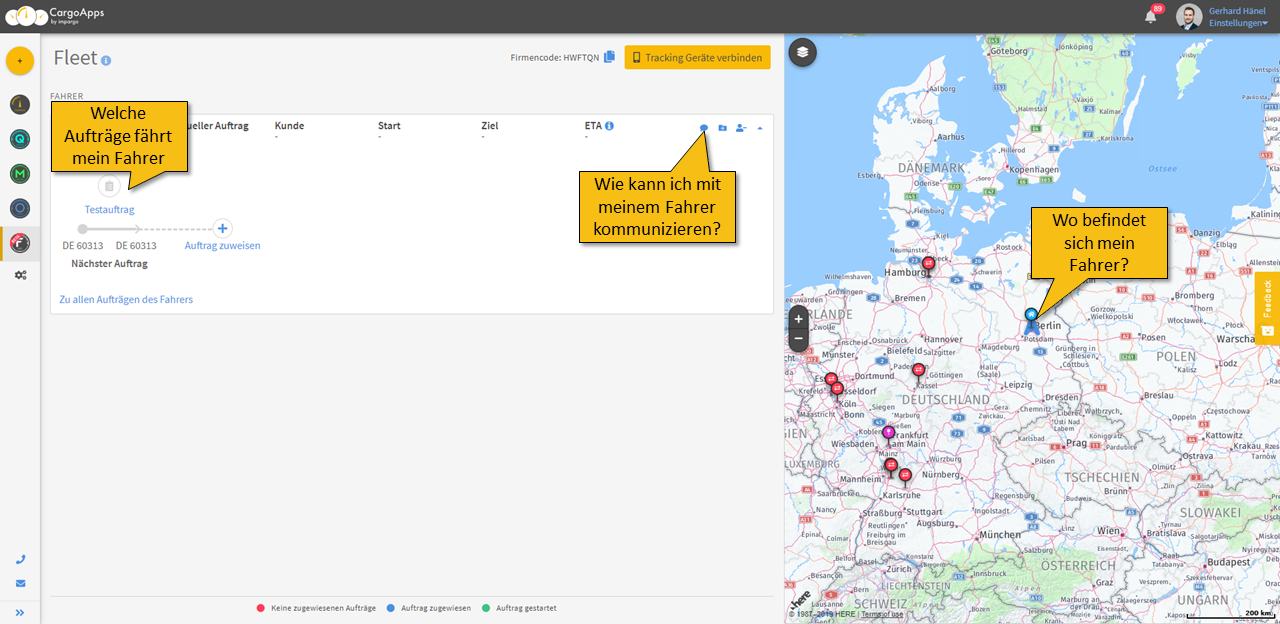Inhalt
- What does Dispatching (freight forwarding)?
- What are the tasks in Dispatching (freight forwarding)?
- What are the delimitations of Dispatching in the industry?
- Which software is used in Dispatching?
What does Dispatching (Freight Forwarding) mean?
In the transportation industry, dispatching is a department primarily responsible for coordinating resources (e.g. personnel, trucks, trailers, etc.) according to schedules and requirements, usually according to predefined business processes. The person responsible for coordination in freight forwarding companies is called a truck dispatcher. The decision to coordinate or provide a resource (e.g., sell cargo space) ends in a transport order.
What are the tasks in Dispatching (freight forwarding)?
In the transport business, the scheduling department is usually responsible for the complete order processing, from the preparation of the quotation to the scheduling plan and invoicing. However, depending on the size of the company, the range of tasks of the scheduling department differs. However, the larger the company, the more limited the range of tasks tends to be. For example, in large companies the accounting department is responsible for invoicing.
Major areas of programming responsibility include:
- Customer acquisition
- Quotation preparation (including order confirmation)
- Truck planning and coordination
- Cost calculation
- Purchase of cargo space through partner networks
- Follow-up of transports
- Emergency management
- Customs clearance
The shipper's tasks include accepting orders and preparing quotations. Subsequently, the dispatcher is responsible for planning and scheduling orders. Planning includes the organization and coordination of resources, such as vehicle fleet and personnel, as well as the calculation of order costs. In addition, the transports must be planned correctly and on time as agreed in the transport contract and in accordance with traffic regulations. For this purpose, the shipper needs expert knowledge of the transport vehicles as well as the applicable regulations. As part of the planning process, the shipper must keep an eye on costs and keep them low accordingly. To optimize truck utilization and avoid costs, the shipper tries to avoid empty runs. Therefore, the scheduling department tries to acquire additional and return loads from partner networks, freight exchanges or direct customers. The shipper is also responsible for managing legal aspects such as customs, so the preparation of customs documents and delivery notes is part of his job. Other tasks of the dispatcher include checking driver logs, managing and controlling the vehicle fleet, as well as documentation in the computer system. Dispatchers also strive to collect information for billing and quality control of services rendered.
The dispatcher is therefore one of the most varied professions in transport logistics. The job description demands a high degree of personal initiative and responsibility. A forwarder thus has a great influence on the profitability of a transport company, as he takes on the tasks of buyer, seller and coordinator. Due to his high degree of responsibility, the forwarder usually shares in the company's profits.
What is the delimitation with Dispatching in the industry?
In industry, scheduling is usually primarily responsible for demand management, which can be demand-driven or consumption-driven.

IMPARGO CargoApps - Fleet Module
What software is used in the expedition?
To increase the productivity and efficiency of shippers and improve the quality of their work, various IT solutions are used. The CargoApps platform, for example, helps the shipper plan routes and then distribute orders to drivers and monitor transportation.

